Index relies entirely on the support of donors and readers to do its work.
Help us keep amplifying censored voices today.
Azerbaijani journalist Idrak Abbasov’s story bears all the hallmarks of the typical forms of pressure used by an increasingly intolerant regime to silence its critics. Abbasov became a target for providing a rare critical voice in a media climate dominated by the state. As a result, Abbasov and his family faced years of pressure, ranging from harassment and threats to physical attacks. Nonetheless, he persisted in his efforts to tell the truth about the situation in his country.
In April 2012, just weeks after winning an Index on Censorship Freedom of Expression Award, Abbasov was brutally beaten by employees of the State Oil Company of Azerbaijan (SOCAR) whilst filming them demolishing houses in his village. As a result of the attack, he was hospitalised and sustained serious injuries, including broken ribs, damage to his internal organs, and injuries to his eyes. No one was ever prosecuted, and SOCAR blamed Abbasov for instigating the attack.
After the attack, the pressure continued to mount against Abbasov and his family – even his young children. Eventually, they were forced to flee the country for safety, like many other journalists, human rights defenders, and political activists, who are forming an ever-growing community of exiles.
Abbasov continues speaking out even now, drawing international attention to the situation in Azerbaijan, and trying to help his colleagues who have been jailed or otherwise targeted. Now, in the midst of an unprecedented crackdown in the country, he has written a letter to Christiane Amanpour in her new capacity as the UNESCO Goodwill Ambassador for Freedom of Expression and Journalist Safety.
In his letter, on behalf of the Sport for Rights campaign, Abbasov detailed the unprecedented human rights crackdown taking place in Azerbaijan, in particular the cases of jailed journalist Khadija Ismayilova, and human rights defender Emin Huseynov, who has been trapped at the Swiss Embassy in Baku since August 2014, facing arrest if he attempts to leave. Abbasov urged Amanpour to make a statement condemning the crackdown and calling for the release of the country’s jailed journalists and human rights defenders.
Abbasov also called on Amanpour to take steps to hold UNESCO responsible for its freedom of expression mandate with respect to Azerbaijan, and to undertake a fact-finding mission to the country. He noted that a visit by Amanpour would be timely in the aftermath of the inaugural European Games – which will take place in Baku from 12-28 June – in light of potential acts of reprisal against Azerbaijanis who speak out in the run-up to the Games.
The Sport for Rights campaign hopes that Amanpour will respond, and take action to address the serious freedom of expression violations in the country, before the situation becomes even worse. In particular, Amanpour could be a useful intermediary with Azerbaijani First Lady Mehriban Aliyeva, herself a UNESCO Goodwill Ambassador.
In the meantime, it is journalists like Idrak Abbasov and Khadija Ismayilova, and human rights defenders like Emin Huseynov, who will continue paying the price for the international community’s silence on the widespread repression being carried out by the Azerbaijani regime. They at least deserve a sporting chance.
Dear Ms Amanpour,
I am writing to you as the UNESCO Goodwill Ambassador for Freedom of Expression and Journalist Safety. Congratulations on your appointment! You may remember me from the Rory Peck Awards in 2013, where I received the Martin Adler Award for my freelance journalism in Azerbaijan. Unfortunately, the situation in Azerbaijan has drastically deteriorated since our meeting in London, and my family and I have been forced to leave the country for safety.
Now, I am writing to you with some requests from the Sport for Rights campaign, a coalition of international organisations working to promote human rights in Azerbaijan in the context of the inaugural European Games, which will take place in Baku this June. In the run-up to the Games, the Azerbaijani authorities have engaged in an unprecedented crackdown to silence all criticism and dissent.
As a result, eight journalists are now behind bars on spurious charges. One of them is prominent investigative journalist Khadija Ismayilova, whom you met when she received an award from the International Women’s Media Foundation in 2012. Khadija is now in detention, facing serious jail time on trumped-up charges of embezzlement, illegal entrepreneurship, tax evasion, abuse of power, and inciting someone to attempt suicide. Khadija has been targeted for her fearless reporting, much of which focused on corruption of Azerbaijan’s ruling elite, including President Aliyev and his family.
Five human rights defenders are also in jail on spurious charges, all strong advocates of freedom of expression. Another human rights defender, Emin Huseynov, remains trapped in the Swiss embassy in Baku, facing arrest on spurious charges of illegal entrepreneurship, tax evasion, and abuse of power. Emin has been targeted for his work as director of the Institute for Reporters’ Freedom and Safety, Azerbaijan’s leading freedom of expression advocacy organization. Emin has long been at the forefront of promoting freedom of expression and free media. He is a tireless defender of free speech, not only in his native Azerbaijan but also throughout the former Soviet Union and beyond.
Besides arrests, the authorities have stepped up other forms of pressure on journalists. Violence against journalists remains a serious problem, with complete impunity for their attackers. Harassment, threats, and intimidation are an everyday reality for critical journalists. A growing number of journalists, like me, have been forced to leave the country for safety.
In light of these and other serious problems, the Sport for Rights campaign has three requests for you. Firstly, we urge you to make an immediate statement condemning the ongoing human rights crackdown in Azerbaijan and calling for the release of the jailed journalists and human rights defenders. We have enclosed a list of their names and case details, and can provide further information as needed.
Secondly, we ask that you take steps to hold UNESCO responsible for its freedom of expression mandate with respect to Azerbaijan. Despite the alarming freedom of expression situation in the country, Azerbaijan has received nothing but praise from UNESCO. Director-General Irina Bokova has consistently failed to mention freedom of expression in her public remarks related to Azerbaijan.
Finally, we encourage you to undertake a mission to Azerbaijan to investigate the situation in the country, visit our jailed colleagues, and raise these serious issues directly with the authorities, including First Lady Mehriban Aliyeva, who is herself a UNESCO Goodwill Ambassador. This would be particularly helpful in the aftermath of the European Games, as we are worried about possible acts of retribution towards our few remaining brave colleagues in the country, as has been the case after past international events.
Thank you for considering our requests, and as ever, for your support for freedom of expression. I would greatly appreciate anything you could do to help improve the situation in my country before it gets any worse.
Sincerely yours,
Idrak Abbasov
A Kenyan woman speaking out for women in one of the world’s most dangerous regions and a female journalist who exposed an unreported uprising in Saudi Arabia are among the winners of this year’s Index on Censorship Freedom of Expression Awards.
“Our shortlisted nominees are all tackling direct and serious threats to stifle free speech,” said Index on Censorship CEO Jodie Ginsberg. “We were humbled and inspired by their stories, and their dedication to ensuring we can all speak freely.”
The awards were presented at a ceremony at The Barbican, London, hosted by comedian Shappi Khorsandi whose father Hadi was forced into exile from Iran because of his satirical writing.
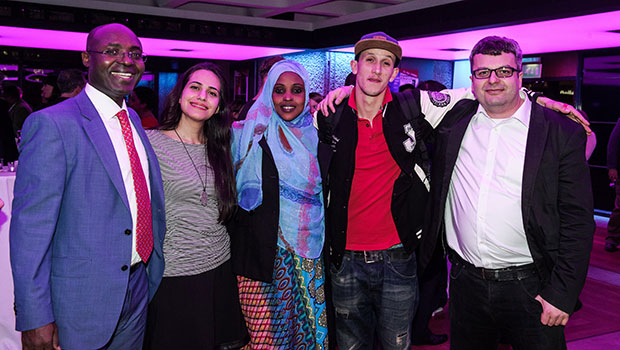
Index on Censorship 2015 Freedom of Expression award winners: Rafael Marques de Morais (journalism), Safa Al Ahmad (journalism), Amran Abdundi (campaigning), Mouad “El Haqed” Belghouat (arts) and Tamas Bodoky (digital activism) (Photo: Alex Brenner for Index on Censorship)
Awards are presented in four categories: journalism, arts, campaigning and digital activism. The winners were Saudi journalist Safa Al Ahmad and Angolan reporter Rafael Marques de Morais (journalism – jointly awarded); Moroccan rapper “El Haqed” (arts); Kenyan women’s rights campaigner Amran Abdundi (campaigning); and Hungarian freedom of information website Atlatszo (digital activism).
The crime of free expression
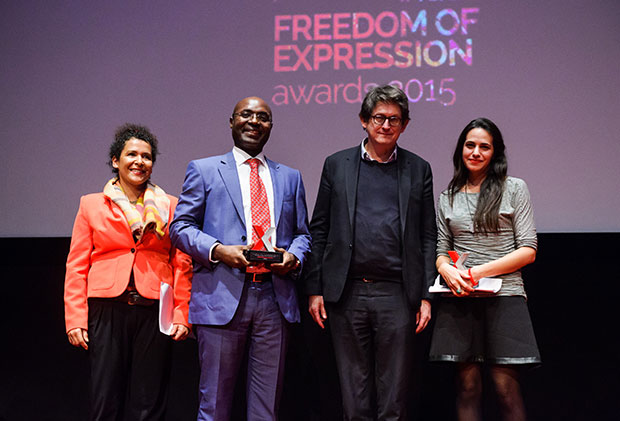
Journalist and campaigner Mariane Pearl, journalism award recipient Rafael Marques de Morais, Guardian editor Alan Rusbridger and journalism award recipient Safa Al Ahmad (Photo: Alex Brenner for Index on Censorship)
Al Ahmad was recognised for her documentary Saudi’s Secret Uprising, which exposed details of an unreported mass demonstration in Saudi Arabia. “Safa Al Ahmad dared to go into places that are difficult for women and for reporters, to bring that information back and share it with the world,” said Turkish author Elif Shafak, one of the five judges. Saudi Arabia is a mystery, even to its own people, said Al Ahmad in her acceptance speech: “Parts of our history is deliberately concealed, the present is muddled with rumours and half-truths. The government-owned and controlled media play a major role in the dissemination of those false realities of ourselves and others. This makes facts a precious commodity in Saudi Arabia.”
Angolan investigative reporter Marques de Morais has been repeatedly prosecuted for his work exposing government and industry corruption and will go on trial on 24 March charged with defamation. “Rafael is a very important individual doing very important work in a very, very difficult environment,” said judge Sir Keir Starmer QC. Marques de Morais dedicated his speech to the Zone 9 group of Ethiopian bloggers currently in jail “for the crime of exercising their right to freedom of expression”.
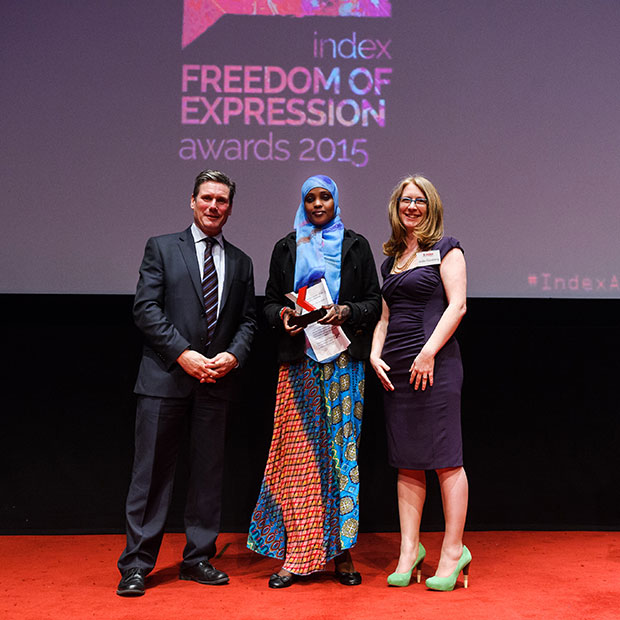
Doughty Street barrister Keir Starmer, campaigning award recipient Amran Abdundi and Index on Censorship CEO Jodie Ginsberg (Photo: Alex Brenner for Index on Censorship)
The winner in the campaigning category, Amran Abdundi, is a women’s rights activist based in north-eastern Kenya and runs a group helping women along the dangerous border with Somalia, where terrorism and extremist violence dominate. Judge Martha Lane Fox said: “Amran Abdundi was a standout candidate for me. She is doing something incredibly powerful in an unbelievably complicated and dangerous situation.” Abdundi dedicated her award to the “marginalised women of northern Kenya… who will now know that their struggles and their efforts to fight for their rights are being recognised internationally”.
Help us let the world know the truth
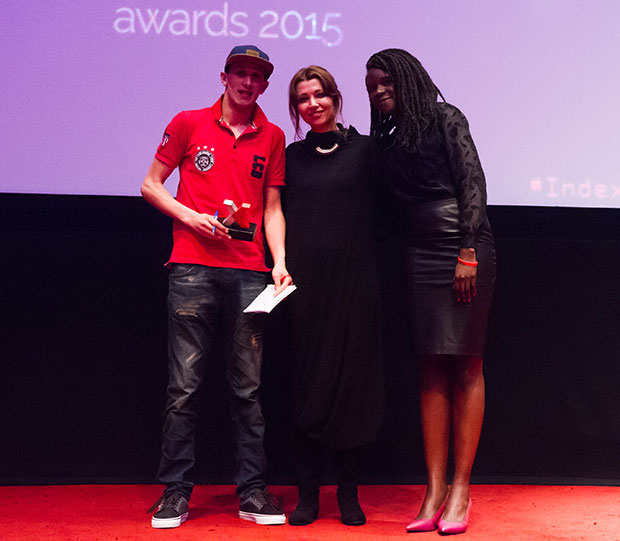
Arts category winner Mouad “El Haqed” Belghouat, novelist Elif Shafak and actor Stella Odunlami (Photo: Alex Brenner for Index on Censorship)
Arts category winner Mouad “El Haqed” Belghouat is a Moroccan rapper and human rights activist whose music highlights widespread poverty and endemic government corruption in Morocco. He has been imprisoned on spurious charges three times in as many years, most recently in 2014. Belghouat said in his acceptance speech: “I have been through difficult times: I was jailed, fired from my work, rejected by many friends. I am still forbidden to sing in my own country. But after all that I am still determined that I will never change my position. I will fight for freedom, equality and human rights for ever.” Lane Fox said Belghouat had taken his music and “translated it into a kind of online activism, but then, crucially, mobilised people in the street”.
The digital award, decided by public vote, went to Hungarian investigative news outlet Atlatszo.hu managed by Tamás Bodoky. The website acts as watchdog to a Hungarian government which has increasingly tightened its grip on press freedom in the country. Editor-in-chief Bodoky said Atlatszo.hu called on all those who believe that independent journalism in Hungary is under threat. “All those who agree that politics and business interests have sunk their claws into everyday life. All those who know that taxpayer money is vanishing. We are calling on you to help us let the world know the truth.”
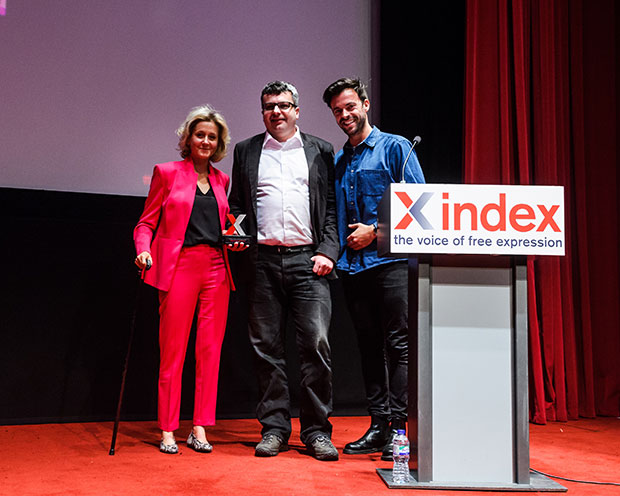
Entrepreneur Martha Lane Fox, digital activism award recipient Tamas Bodoky and actor Jolyon Rubinstein (Photo: Alex Brenner for Index on Censorship)
The awards were presented by the judges along with special guests including Guardian editor Alan Rusbridger.
A special award was also given on the evening to honour the many Azerbaijani journalists and activists jailed or forced into exile or hiding following a recent crackdown by the government. Former award winner and journalist Idrak Abbasov, who was forced to flee Azerbaijan last year, accepted the award on behalf of all those facing persecution in the country. “I call upon the world community to help Azerbaijan… so that our colleagues might be released and that our country might become a normal state in which we and others might live freely,” Abbasov told the audience in a video speech.
The evening featured an exhibition of specially commissioned cartoons by international cartoonists, reflecting on the past 12 months for free expression. Most of the artists had direct experience of persecution over their work, including Syrian political cartoonist Ali Ferzat – a former Index award winner – and Malaysia’s Zunar. “In the wake of the attacks on Charlie Hebdo, we wanted to pay homage to the work of cartoonists who are so often the first to face censorship in any move to stifle free expression,” said Index’s Jodie Ginsberg.
Related
• Safa Al Ahmad: Facts are a precious commodity in Saudi Arabia
• Rafael Marques de Morais: I believe in the power of solidarity
• Amran Abdundi: This award is for the marginalised women of northern Kenya
• El Haqed: I will fight for freedom, equality and human rights for ever
• Tamas Bodoky: The independence of journalism in Hungary is under threat
• Special Index Freedom of Expression Award given to persecuted Azerbaijani activists and journalists
• Video: Comedian Shappi Khorsandi hosts Index on Censorship awards
• Drawing pressure: Cartoonists react to threats to free speech
An earlier version of this article stated that Rafael Marques de Morais will go on trial on 23 March. The date is 24 March.
This article was posted on 18 March 2015 at indexoncensorship.org
The Index Award-winning Azerbaijani journalist Idrak Abbasov says he had been threatened by the family of a man who was arrested after an online posting, according to Institute for Reporters’ Freedom and Safety (IRFS).
“I interviewed Lankaran resident Shahin Agayev, whose daughter was beaten at school, on 14 January and posted it on the internet,” Abbasov told the IRFS.
Agayev was arrested on drug charges on 6 February and a verdict is expected to be announced soon. Abbasov says the charges are clearly false as Agayev “is really poor, he lives literally in a hut.”
Abbasov said that the man’s family blamed him for the arrest via a phone call on 13 May. The family representative told Abbasov that they had “an agreement with the police” that Agayev would be released if he stopped covering the story.
Subsequently, Abbasov reported to Index on Censorship that a man identifying himself as Agayev’s brother-in-law called and told him the police had demanded the original video, above, be deleted, despite widespread sharing.
Two days later, the man called Abbasov again — this time to arrange a meeting about a potential story.
“I have worked in Azerbaijan for long enough to understand it is a trap,” Abbasov said. Sources confirmed his suspicions. The plan had been to attack him during the meeting, potentially wounding or leaving him for dead.
“To protect myself I had to publicize the plan, and so far it has been quiet,” said Abbasov, who has been violently attacked for his work as an independent journalist.
Abbasov was named the Index on Censorship and Guardian journalism award winner 2012 for his investigative work.
More >>>
• Complete Coverage: Idrak Abbasov
In the run up to the presidential elections in October 2013, there have been increased attacks on free expression in Azerbaijan. And social media has become a new target for the country’s authorities, says Idrak Abbasov
(more…)